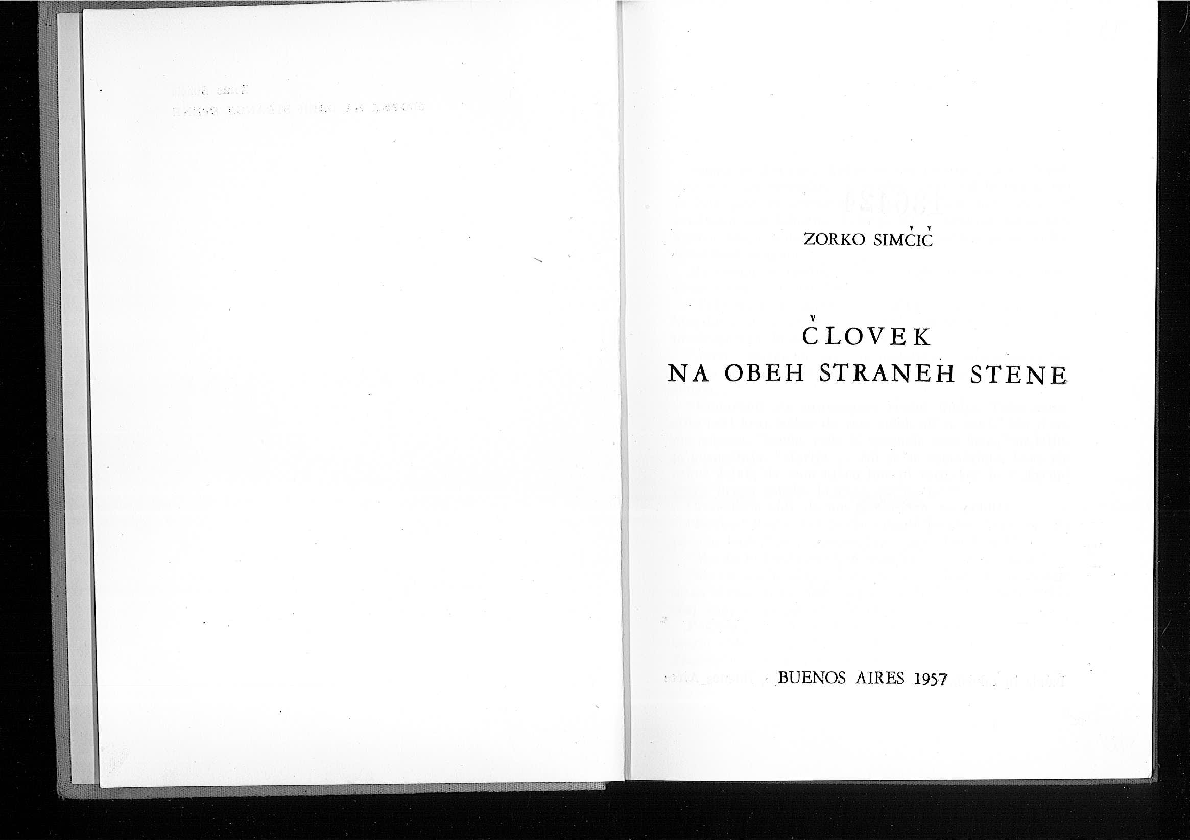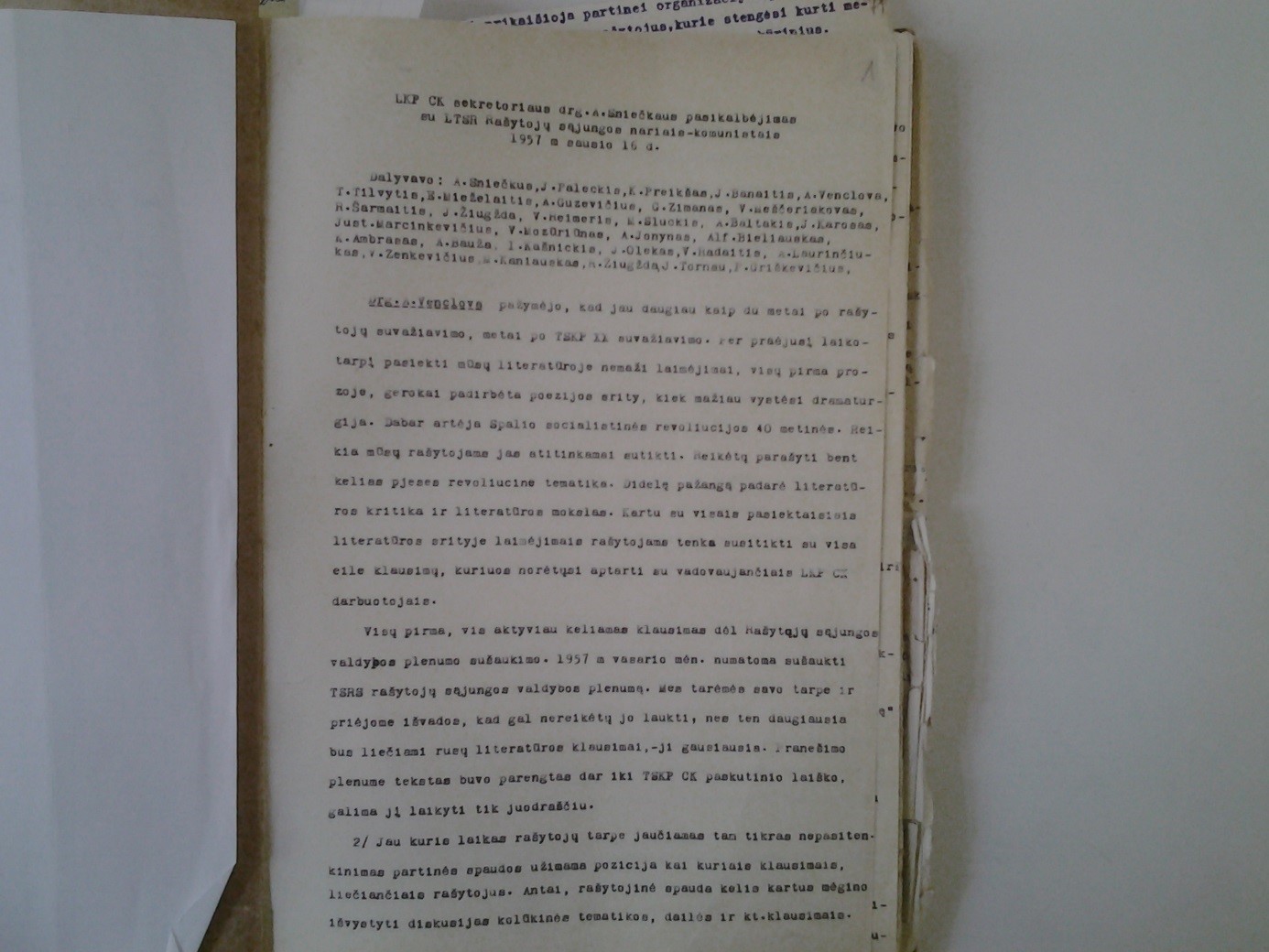 1957 - Julius Várallyay as a founding member of UHFS starts collecting the documents of the organization
1957 - Julius Várallyay as a founding member of UHFS starts collecting the documents of the organization
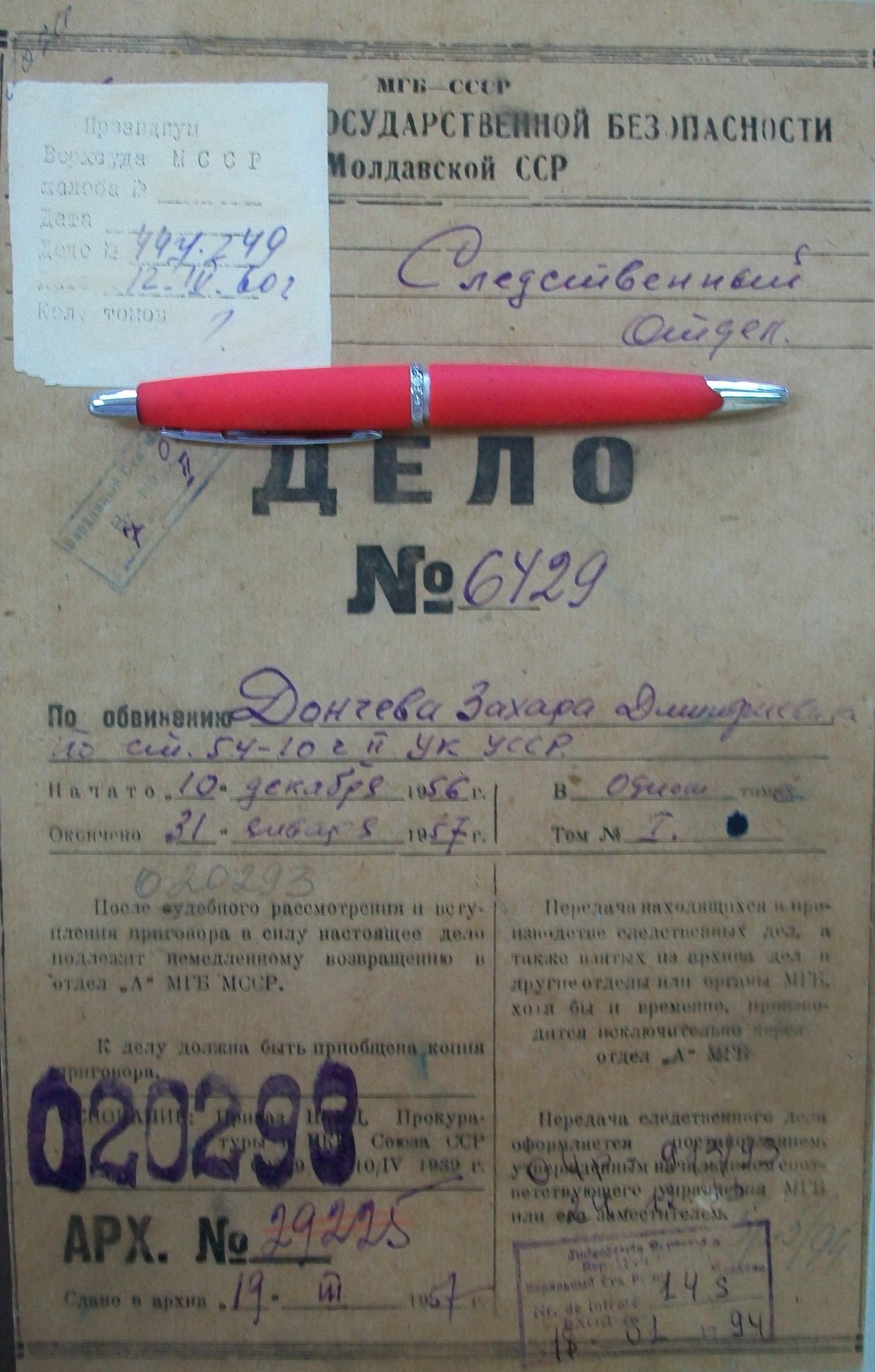

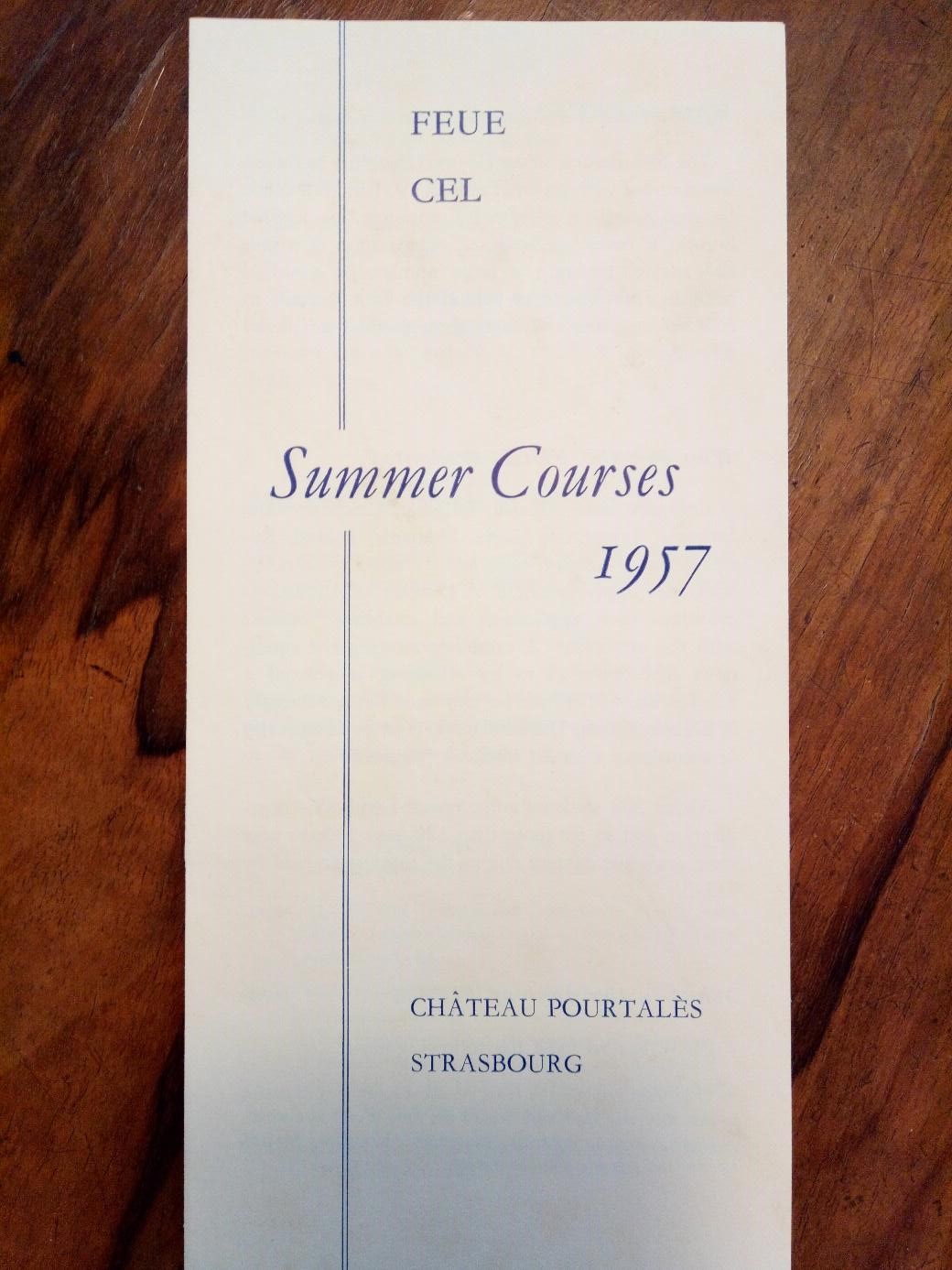

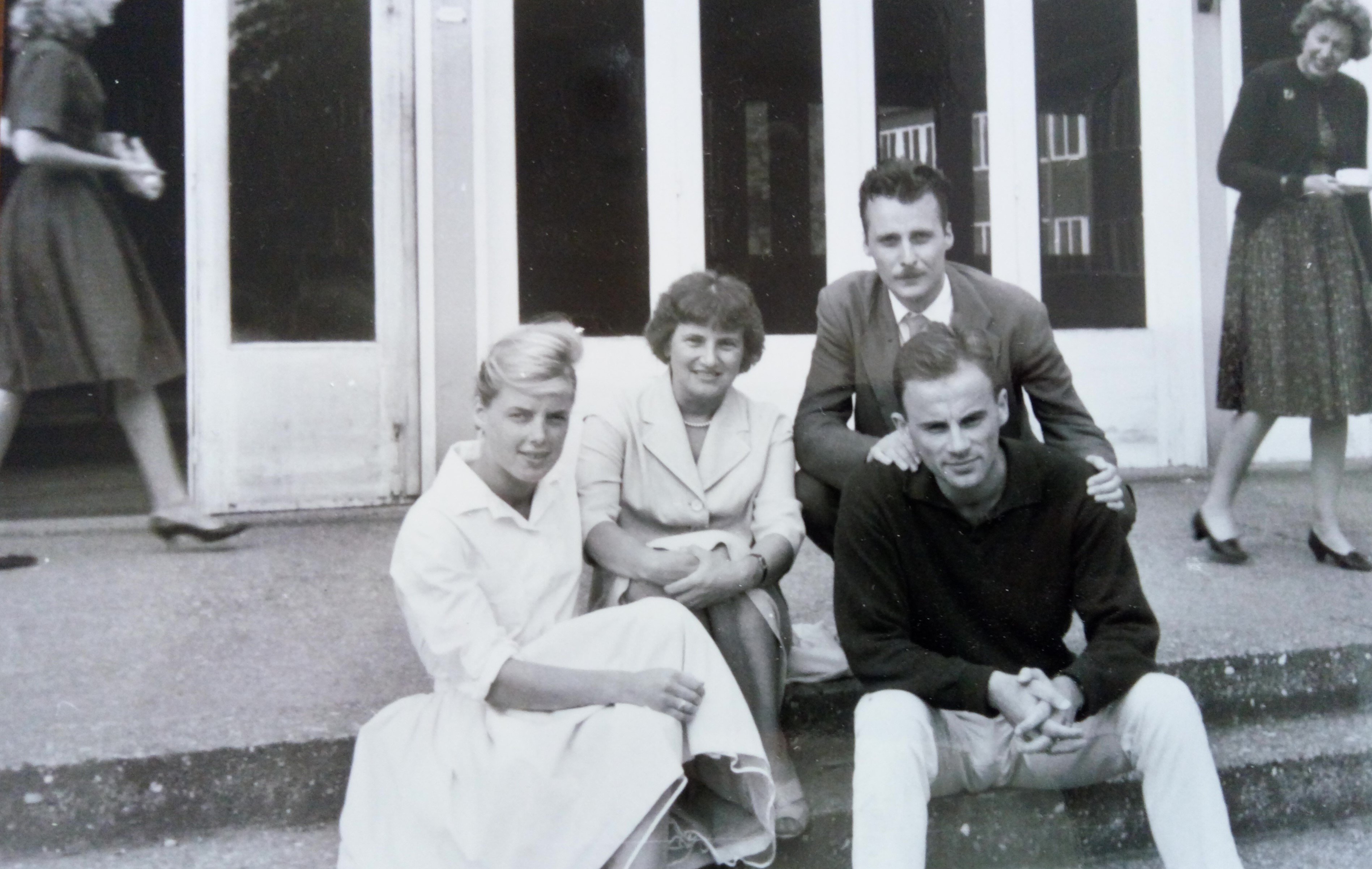
The Free Europe University in Exile (FEUE) was founded by the National Committee for Free Europe in New York in 1951 as a specific type of academic organisation. The purpose of the organisation was to enable academic education in a democratic spirit to a large number of immigrants who left the states ruled by communist regimes. Émigrés from Albania, Bulgaria, Czechoslovakia, Estonia, Yugoslavia, Latvia, Lithuania, Poland, Romania and Hungary could apply to this university. The University's goals were to train young émigrés to find jobs and fit into the democratic world as teachers, professors, engineers, doctors, scientists, economists, lawyers, historians, and so forth. They were supposed to become the drivers of a liberal-democratic system in Central and Eastern Europe after the fall of communism. Since 1952, the University has conferred scholarships for its summer seminars held in the Château de Pourtalèâs in Strasbourg. The seminars were focused on contemporary focal political and cultural issues. Lecturers at the Summer Seminar were prominent members of the academic community and experts from Western Europe and the United States.
Jakša Kušan was a FEUE student. He believes that the FEUE lecturers were elite members of the liberal academic community from the United States as well as numerous prominent European intellectuals and émigrés. What Kušan considered even more important was that students/refugees from the countries under communist rule could meet there and exchange ideas. There he began his cooperation with Tihomil Rađa and Branko Salaj, with whom he later founded and edited the magazine Nova Hrvatska. These summer seminars were, according to Kušan, an arena of ideas and cultural contacts. He thinks that the Poles and Estonians used these scholarships very well because their new liberal intelligentsia was forged there.
The Yugoslav communists wrote that the FEUE was a school for CIA collaborators. According to Kušan, the United States intended to gather people who would return to Europe one day and on whom they could rely when communist rule collapsed (Interview with Kušan Jakša_2). Of all the organisations that the USA funded, only Radio Free Europe survives to this day. Financing of the rest ceased when the US saw that there were no significant results from them (Interview with Kušan, Jakša_2).
The Jakša Kušan Personal Papers contain materials from some of the FEUE seminars, such as a brochure on a seminar held in 1957. According to the brochure, the seminar in 1957 continued the tradition of a one-month seminar that was held from 6 August to 7 September. It was devoted primarily to international relations and the political, economic and social problems of Central European satellite states. The 1957 seminar featured intellectuals such as Czesław Miłosz and Bogdan Radica as lecturers.
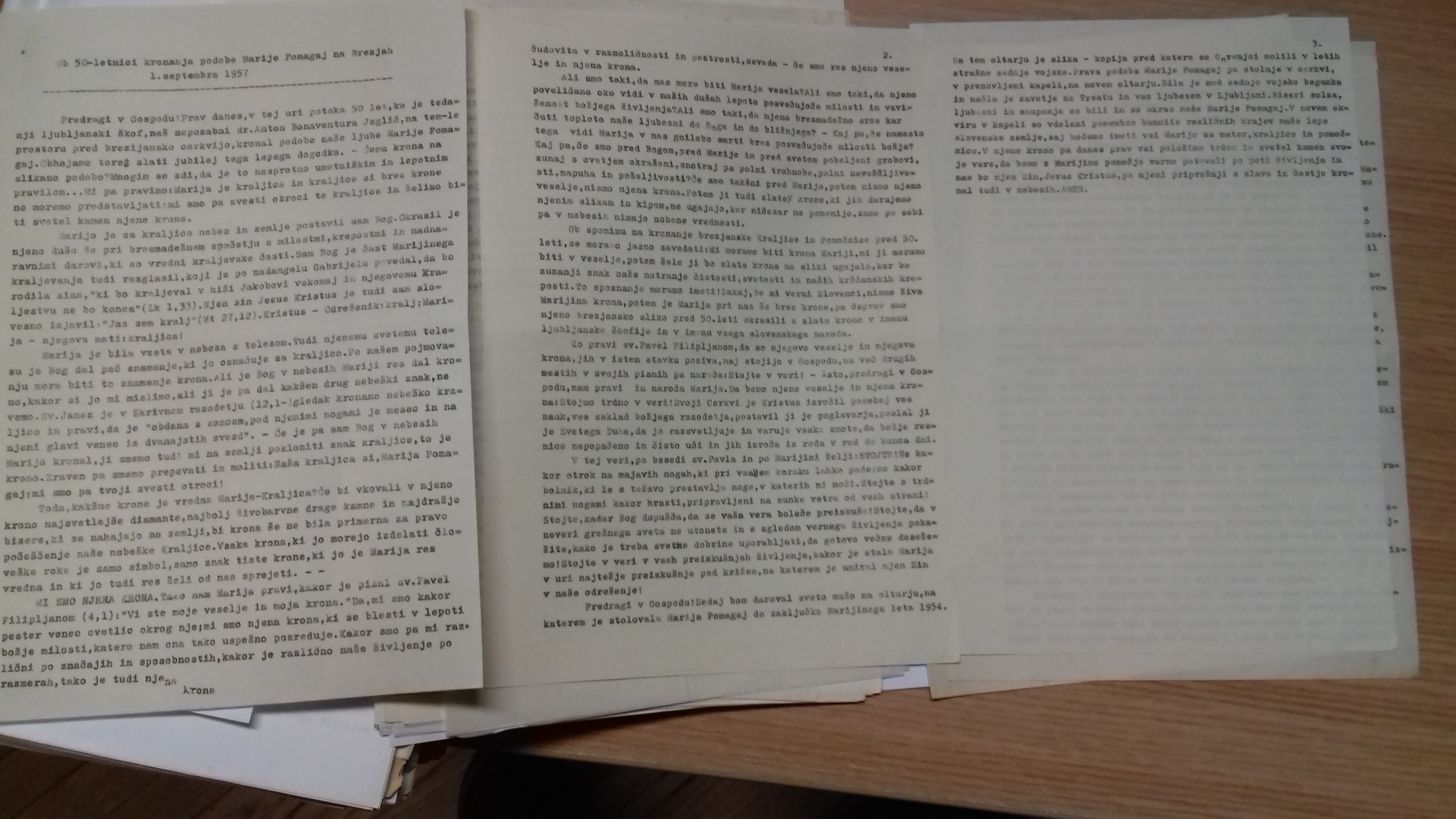

The sermon is an ideal example of Anton Vovk's theological views, which included preservation of the honour of the Catholic Church and its struggle for human liberty and dignity. It served as a source of encouragement for the faithful. The message was cloaked in rhetoric that did not openly attacking the ruling regime. But the fact that it was very clear about the Christian worldview, which was in conflict with the worldview imposed by the regime made the sermon a very influential and important milestone in relations between Bishop Vovk and the state, showing that he was not deterred from propagating the Christian truth even after an extremely violent attack – the burning in 1952. Document is located in the Anton Vovk Collection and it is available for research purposes.
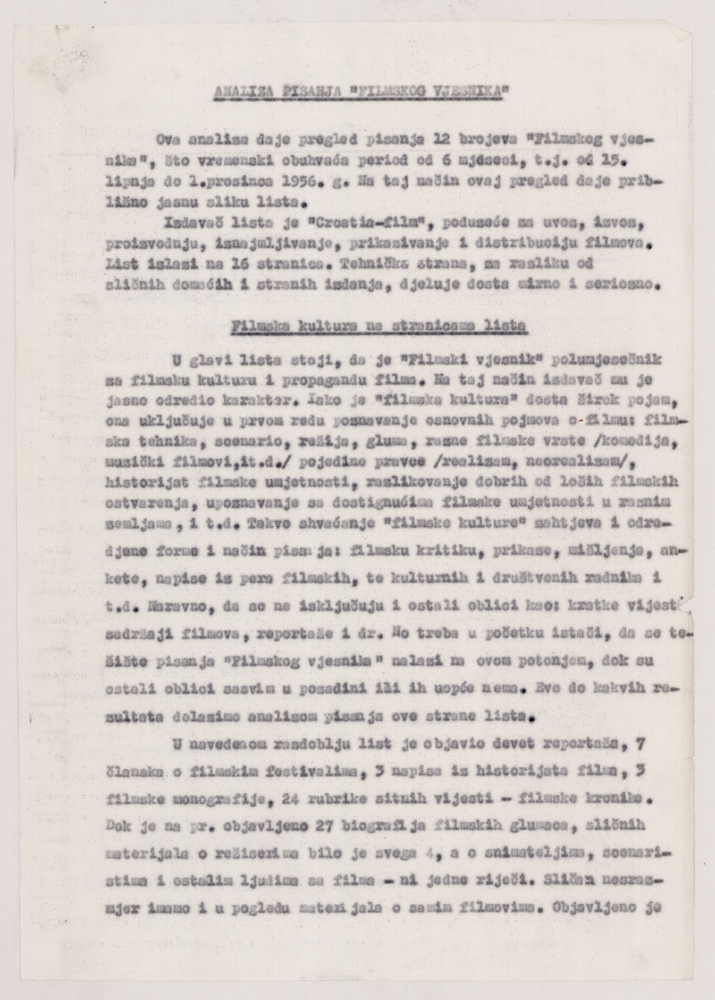
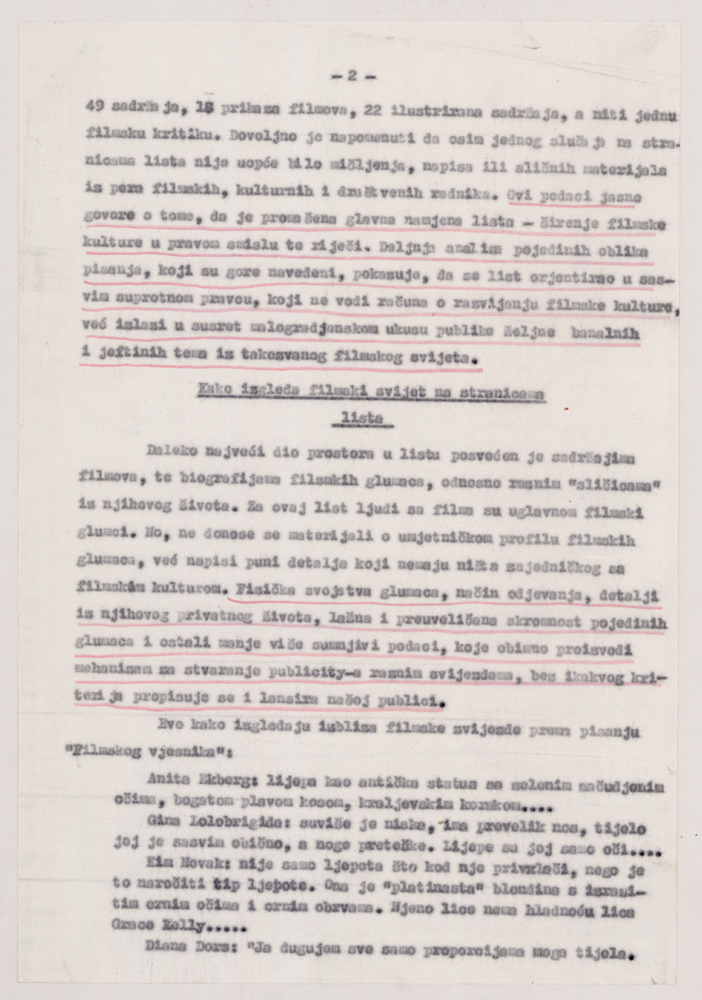

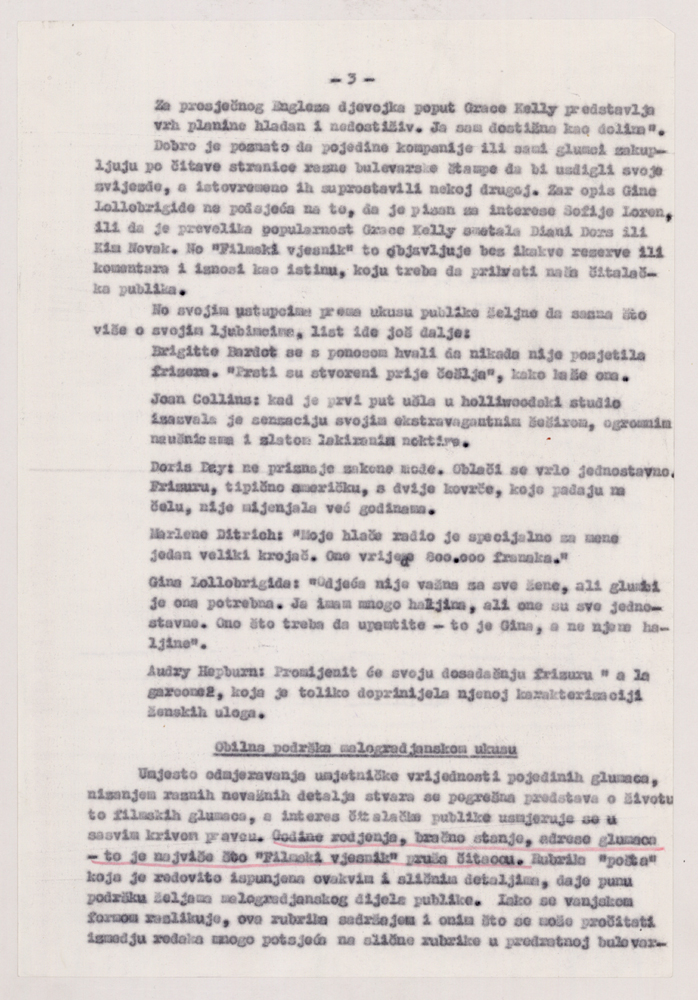

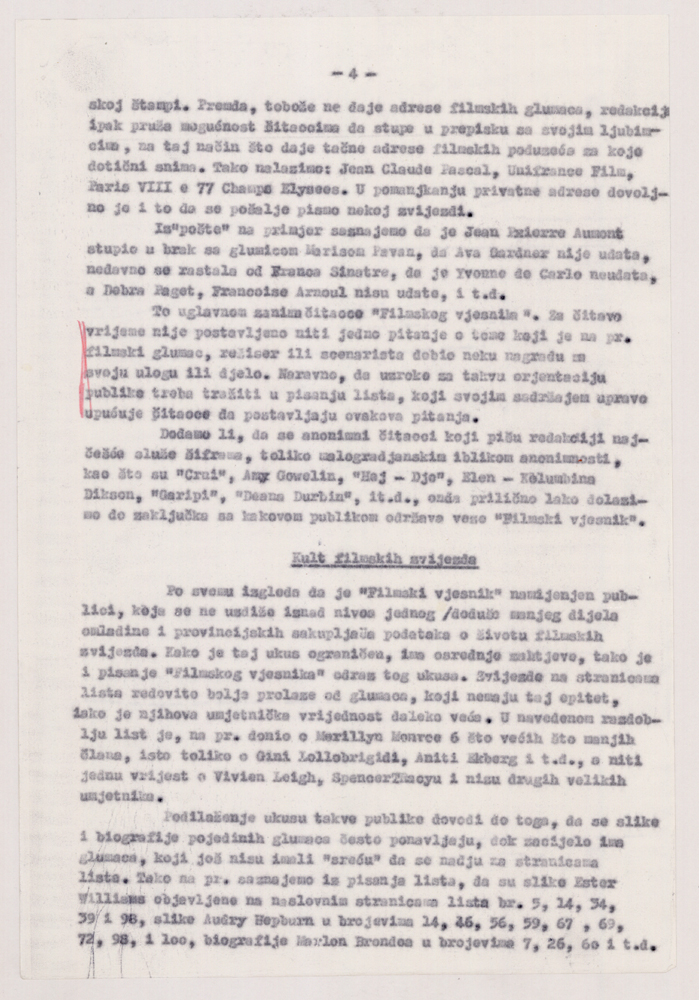


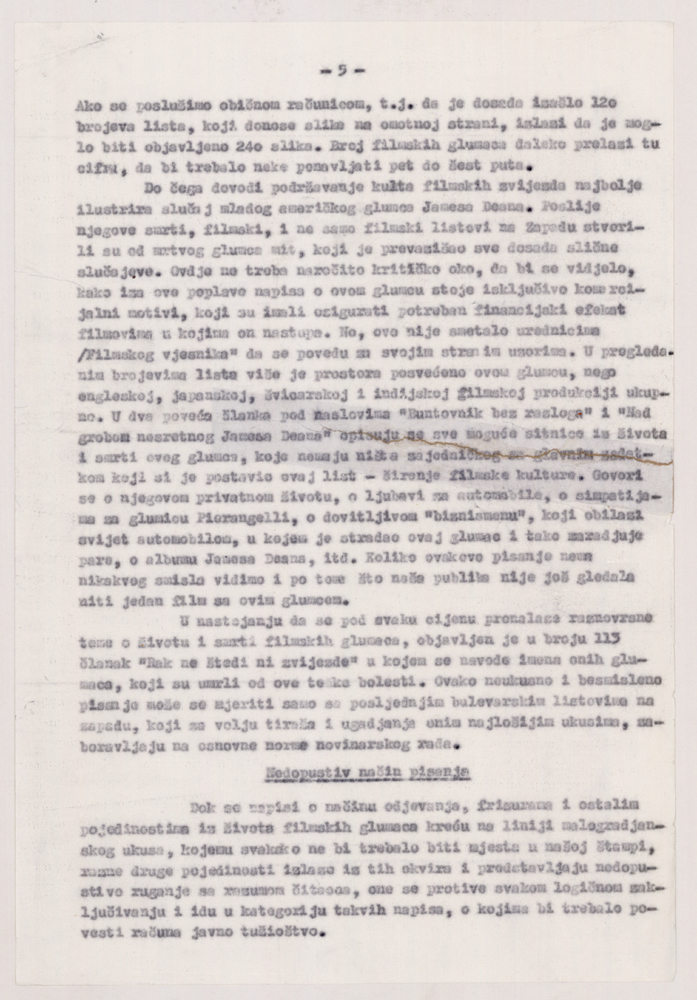
This analysis is part of the more extensive material that was sent to the Central Committee of the People's Youth of Croatia (PYC) by the Presidium of the Main Committee of the Socialist Alliance of the Working People of Croatia (SAWPC) on the forthcoming conference on problems of film releases and the columns of weekly and daily newspapers. The document analyses in detail the writing of the magazine Film News, published by Croatia-film, based on categories of articles, from June to December 1956. The opinion on the magazine was not good, and it was suggested that the paper did not contribute to "expanding of the film culture" but rather "meets the bourgeois taste of the audience" and also completely excludes film criticism. The negative role of the magazine was emphasized, as well as the erroneous formation of the public's cinematic education because of the preference for American productions, sensationalism and writing about movie stars, "spreading an atmosphere unsuited to our reality", publishing articles ideologically contrary to "our perceptions" and neglecting domestic film themes. Since the magazine was intended for young people, it was suggested that it should thoroughly change its writing style or cease to exist in this form. The content of the analysis argues in large part that the writing of the magazine was inappropriate to the authorities and therefore changing or abolishing the magazine was proposed.
This PYC document, along with the records of other so-called socio-political organizations, was until 1995 a part of the Archives of the Institute of History of the Croatian Workers' Movement/Institute of Contemporary History. In July of that year, the archives were handed over to the Croatian State Archives (CSA), where they are kept today. It is not known whether this document has been used by researchers.
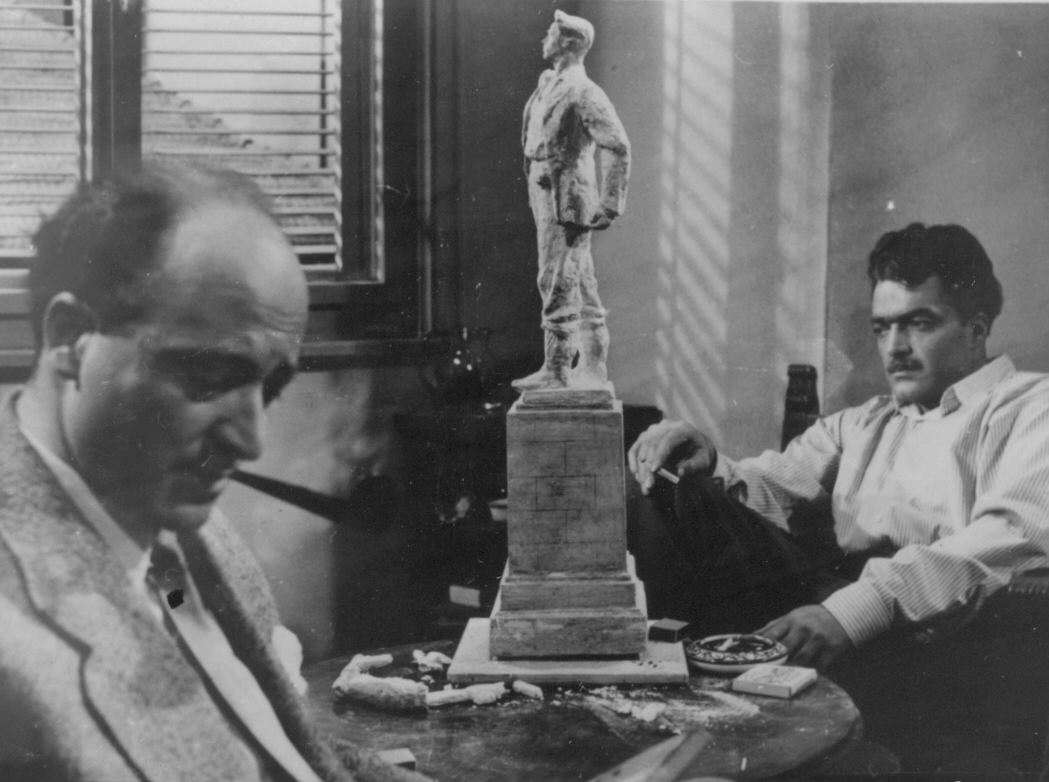

Life Flows Quietly By.../Partisans (1957), director Binka Zhelyazkova, script-writer Hristo Ganev, cameraman Vasil Holiolchev
The movie was created from the point of view of participants in the communist resistance who truly believed in the communist utopia. Initially, the script was entitled "Partisans". The plot is built around the clash between former partisans who remain true to their ideals and partisans who betray them. The principal character is a former partisan leader who is an embodiment of moral degradation, narrow-mindedness, touchiness and presumption and who exchanged his ideals for the high position of director general. After a series of well-described deep psychological dramatic situations, the end of the movie increases the feeling of despair and no future.
The creation of the film went through a number of obstacles. After a series of discussions of the script, the screen tests, the directorial script, the finished movie etc., in 1958 the film was banned with a Decree of the Central Committee of the Bulgarian Communist Party regarding the state and the further development of the Bulgarian cinematography. The chronology and the locations where the discussions took place as well as the participants reveal the censorial mechanisms, the institutions and the strong centralization of the party policy of direct intervention in the creative process. The discussions of the film script began in 1955 in the Artistic Council (AC) of the Feature Film Studios (FFS); on that level there were different opinions and a number of artists shared positive views about the script of Hristo Ganev; they found it to be "absolutely necessary", "innovative, brave script which disclosed problems that needed to be solved' and even recommended "sharpening". The directorial script of Binka Zhelyazkova was also supported by some of the cinematographers. There were brave positive opinions about the finished movie as well. The meetings were then moved to the office of the Minister of Culture. There were debates on that level as well. The then Director of FFS Georgi Yovkov declared: "This will be a useful movie. We always plead realism but very often we kill it." Many of the cinematographers present openly supported the film in which they saw "perfect conformity of directorial concept and visual decision". The Artistic Council of FFS nominated in early 1958 the movie for participation at the festival in Karlovy Vary in 1958; another contested movie, "On the Small Island" (director Rangel Valchanov, script-writer Valeri Petrov, cameraman Dimo Kolarov), was nominated for the festival in Cannes. Several months later there was another final discussion of the finished movie with the new title "Life Flows Quietly By..."; the meeting was presided over by the head of the Administration of Cinematography. Although there were debates even on that level and the cinematographers present defended the movie, it was stigmatized mainly by former partisans holding high public positions, predominantly military, as unsound, slanderous and anti-party "film which is only capable of giving grounds to our enemies to talk against the party and the partisan movement", "pernicious and it will harm the working class in the people's democratic countries as well as in the capitalist countries". The final decision about the movie was made by the Central Committee of the Bulgarian Communist Party with the Decree of July 5, 1958. "There are particular films which present our reality one-sidedly and distortedly such as "Life Flows Quietly By...". In fact, this film dethrones the image of the national partisans, slanders their struggle and dedication to the national cause, makes untrue generalizations about our reality." The movies "Life Flows Quietly By..." and "On the Small Island" were banned. The executive bodies of the Administration of Cinematography, the Feature Film Studios and the Ministry of Culture were replaced. The party censorship strengthened. "Life Flows Quietly By..." was shown 31 years later, in 1988 (all quotations of reports from the discussions and of resolutions are by Станимирова 2012: 93-142).
The troubles of the movie increased the feeling of fear and insecurity among the then Bulgarian film-workers and paralyzed the entire cinema production in Bulgaria. Nevertheless, in the following years and decades, there still were vanguard, brave and engaged original films.
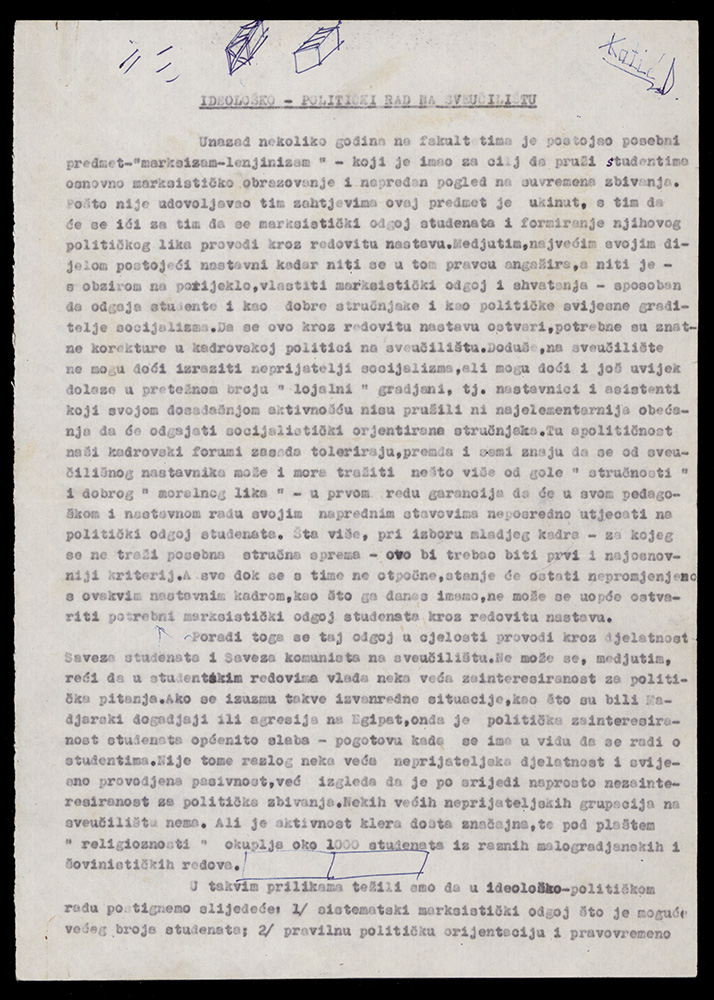
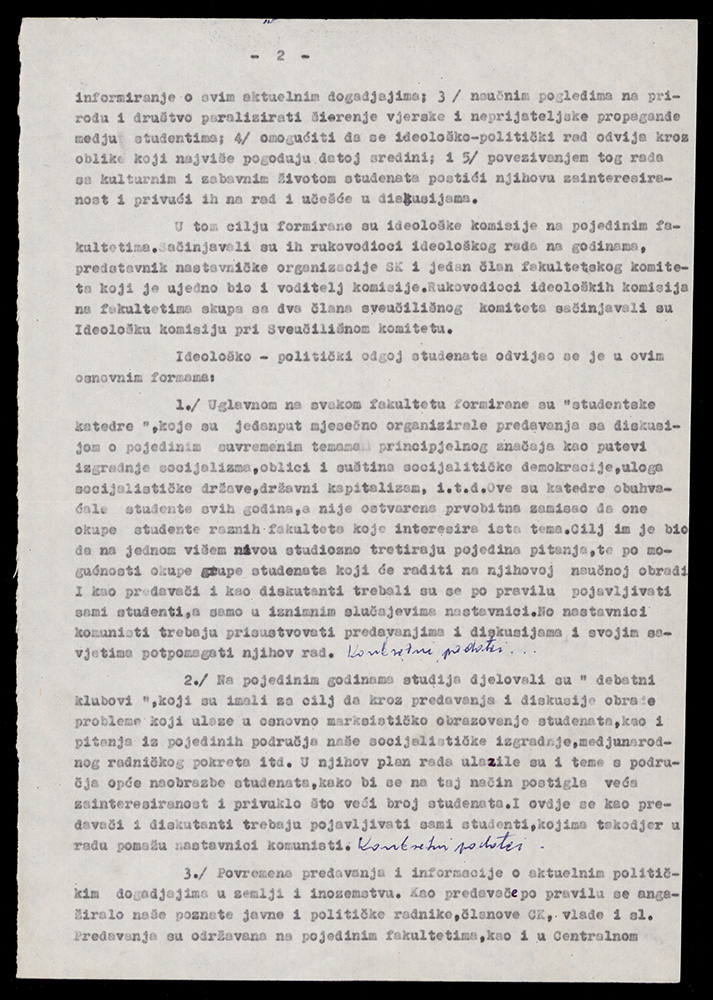
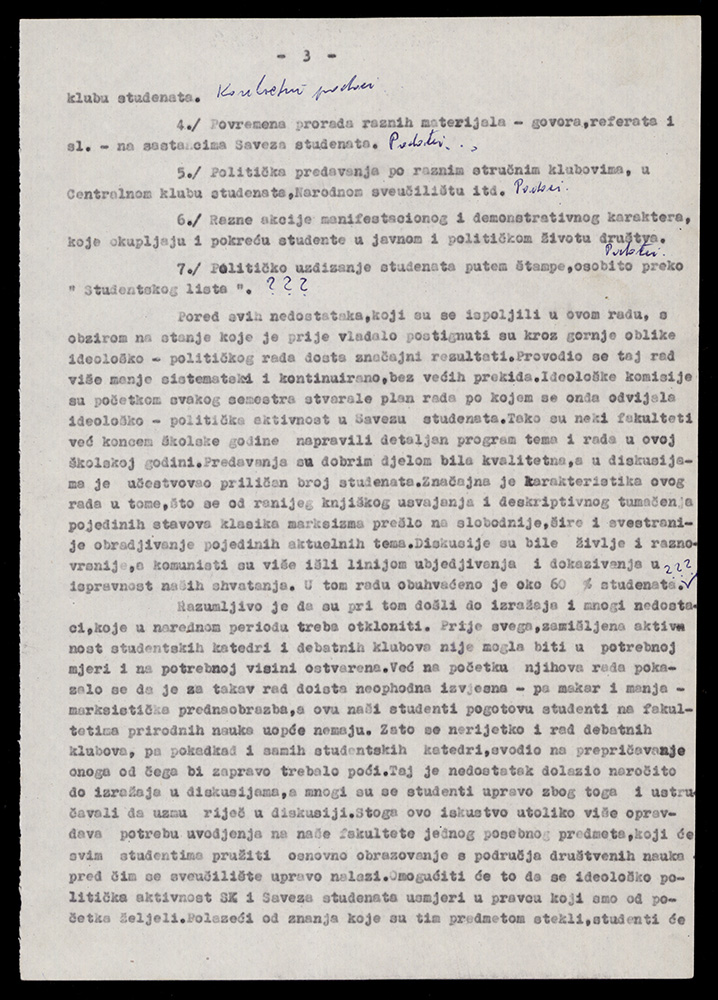
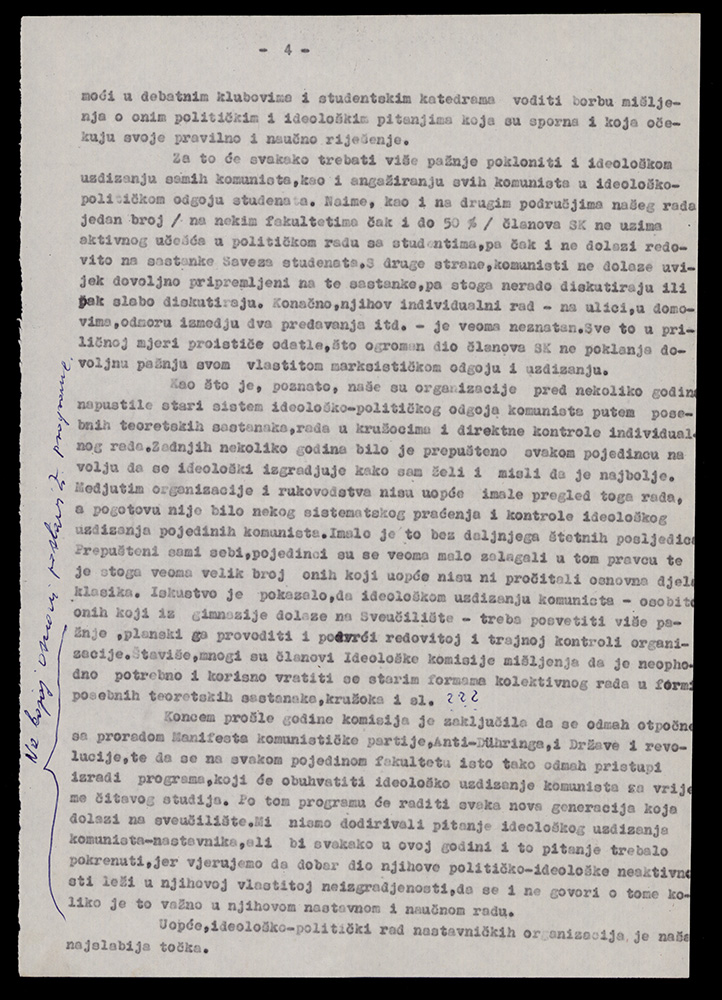
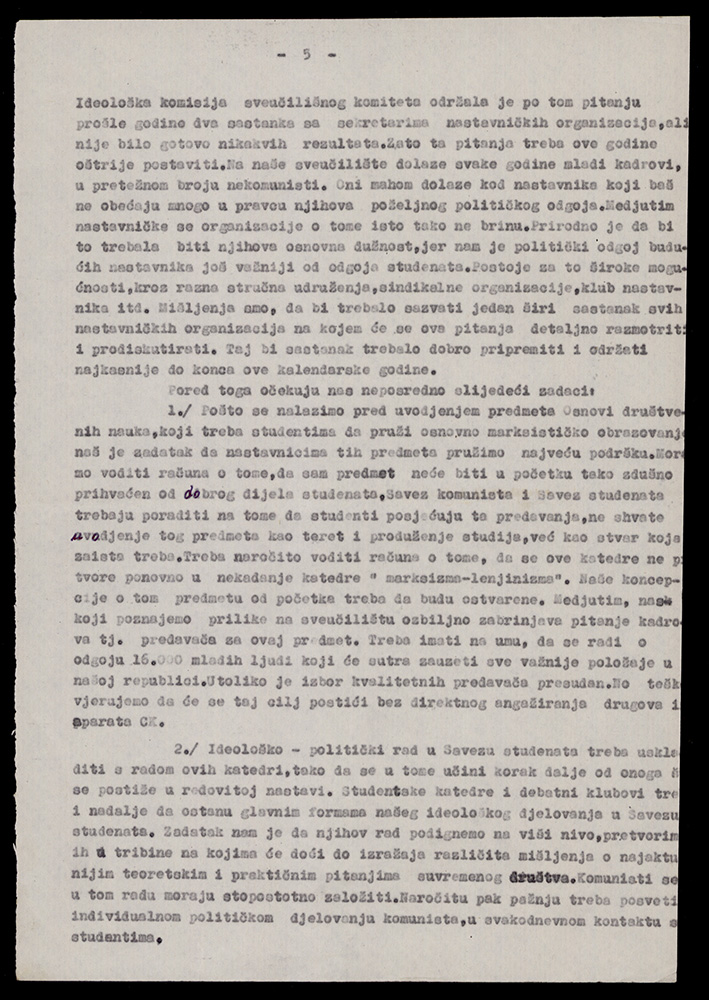
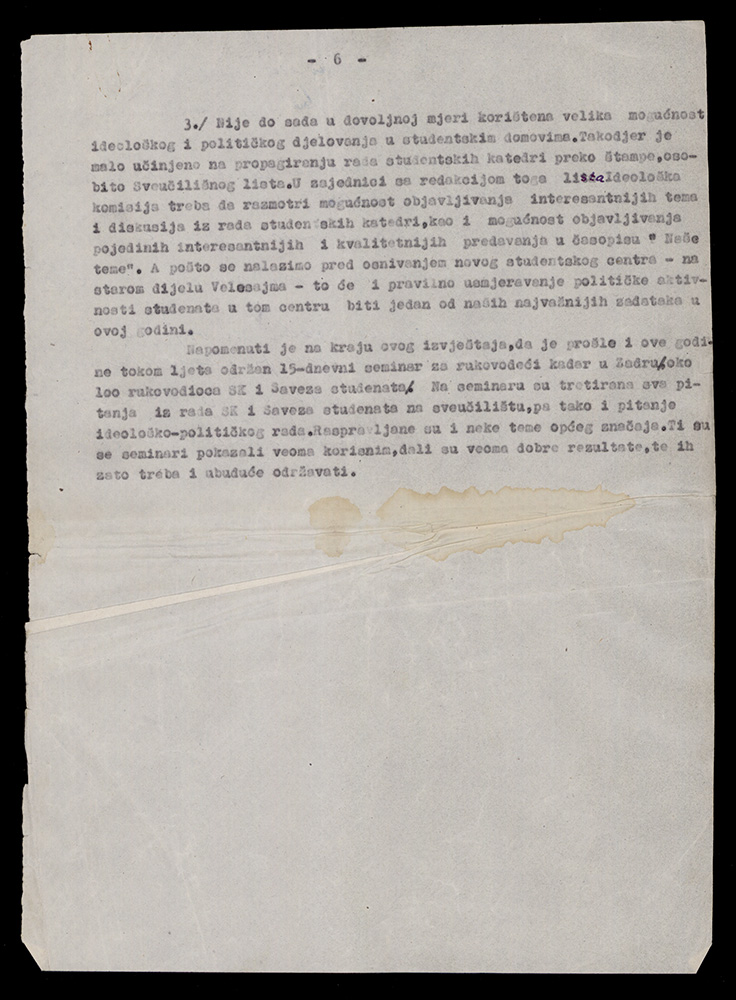

 Report for the Ideological Commission's session "About Some Problems of the University's Ideological Work," 1957
Report for the Ideological Commission's session "About Some Problems of the University's Ideological Work," 1957
This is a document that analyses the ideological activity of the League of Communists (LC) at the University (in Zagreb) and is essential for understanding the way in which LC, through the Ideological Commission, directed the ideological activity in the desired direction in higher education. The "correct" ideological attitude was expected from both students and professors, so the issue of staff in the faculties was of great importance for the political guidance of students. The document criticizes political apathy and a lack of interest by professors and students and seeks to strengthen 'Marxist education" and ideological work, the suppression of religious and "enemy" propaganda opposing scientific (meaning Marxist) views of the world, attracting students providing information on current events and encouraging culture and entertainment. It also proposes a program of ideological work for the entire duration of schooling for students, as well as work with members of teaching organizations.
By 1995, the document was, along with the other records of socio-political organisations, a part of the Archive of the Institute of History of the Labour Movement of Croatia/Institute of Contemporary History. That year, in July, it was handed over to the Croatian State Archives (CSA), where it is kept today. The documents are accessible for use without any restrictions.
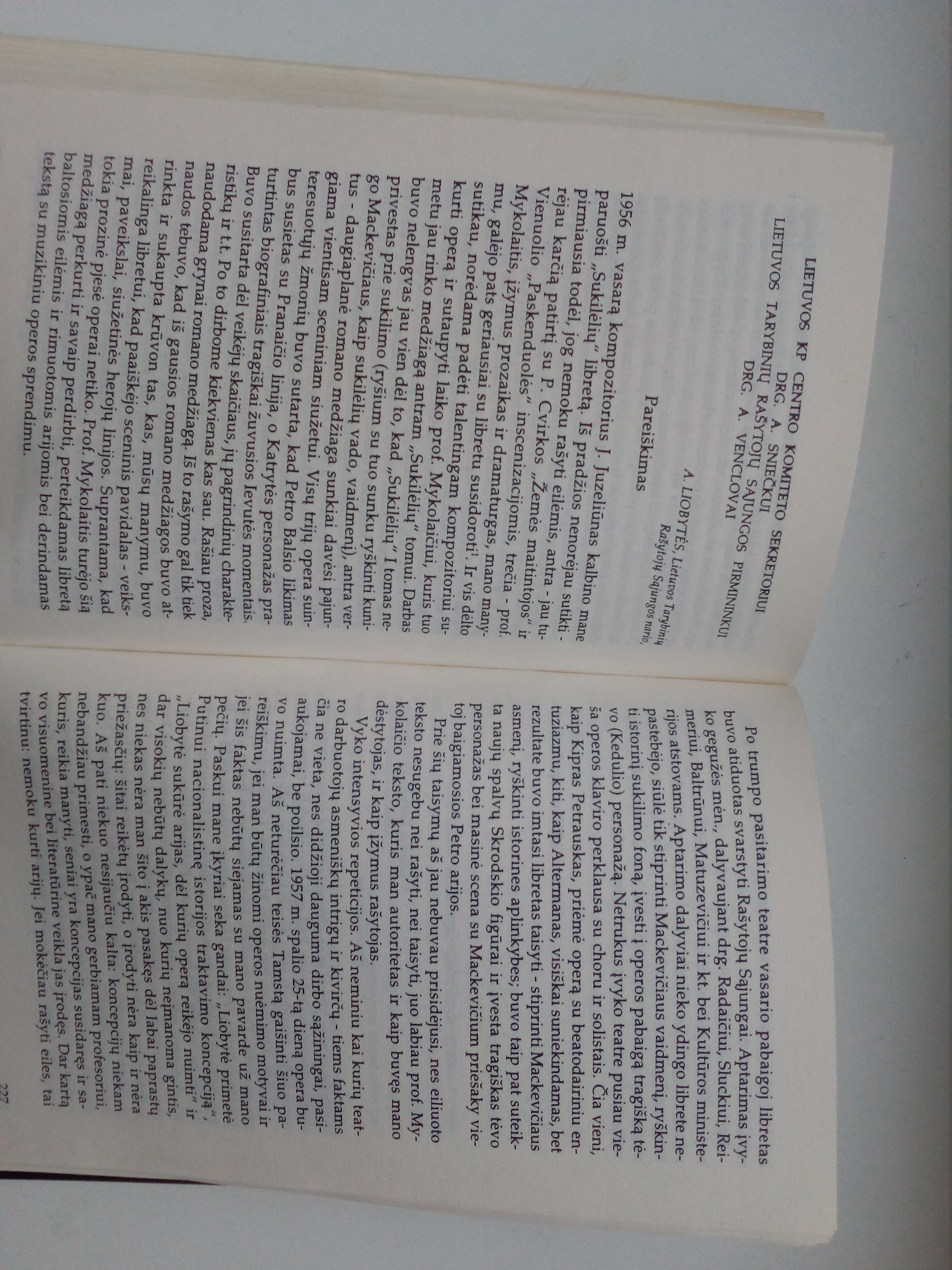

In 1957, Liobytė wrote to Antanas Sniečkus, the first secretary of the Lithuanian Communist Party, and Antanas Venclova, the chairman of the Lithuanian Writer's Union. In the letter, she tried to explain the difficulties relating to the creation of the opera Sukilėliai (The Rebels). The opera was based on the novel of the same name by Vincas Mykolaitis-Putinas, who is often called the informal leader of the silent anti-Soviet opposition. Liobytė was invited by the composer Julius Juzeliūnas to write a libretto for the opera, which was blamed for nationalistic ideas and attitudes. In the letter, Liobytė argued that the accusations made about her behind her back were unfair, and asked for open consideration of the question of the opera. Despite this, the opera was never publicly performed. The writing of the libretto was one of the reasons why Liobytė was forced to step down from her editor’s position at the Literary Fiction publishers in 1961.


During 1957, Eginald Schlattner was subject of searches by the Securitate, which confiscated several manuscripts, letters and books. Some of the letters and manuscripts, in particular the story “Gediegenes Erz” (Solid ore), were used by the secret police as evidence of his alleged “subversive” literary activity. The Securitate officers argued that although “Gediegenes Erz” followed the formal rules of realist socialism, its ideological content was “counter-revolutionary” because it described the “mobilisation” of Saxon youth in Transylvania in order to preserve their cultural identity. After his release from prison in 1959, Eginald Schlattner received back the material confiscated by the Securitate, including this story.
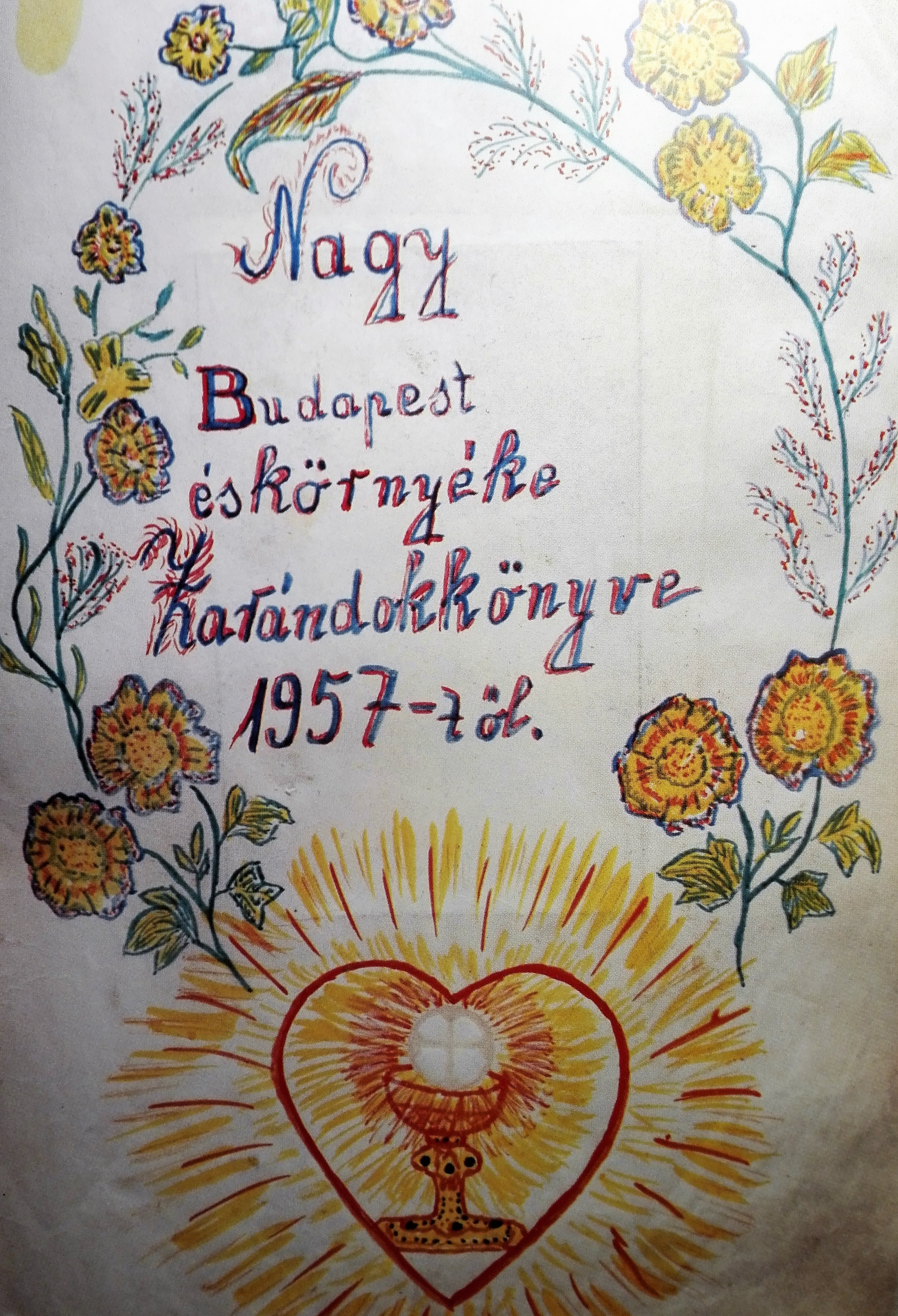

Legend says József Fodor was a prominent guide and organizer of religious festivals for a long time. When he appeared, he soon became the main figure of the events, beyond the liturgy proper. The old pilgrims had already known him and expected his entrance on these occasions.
József Fodor was born on 27 June 1921 in Veresegyháza. He learned how to lead a religious festival procession from his mother, who died in 1936. In 1940, Fodor began to lead regular pilgrimages to various shrines. In his handwritten and illustrated book, he documented his religious festival trips from 1957 to 1974. The book contains photos and religious quotes. On each trip, he asked the parish priest, the chief lieutenant, or the bishop to add personal notes to his collection. Between 1957 and 1974, he led 153 pilgrimage groups, 12 of which went abroad. In the nearly ten years between 1962 and 1971, 120 groups took a pilgrimage trip with his guidance. In the course of his journeys, he visited 45 Hungarian and 16 foreign shrines. He often returned to a few of his favorite places, but he always strove to visit new places. He was ill for longer periods. We don’t know much about the pilgrimages he took after 1974. József Fodor died in Budapest in 1984. József Fodor’s book was made part of the collection of the Christian Museum in 1986. Sándor Soós published József Fodor’s book in 2008. Soós listed the pilgrimages which Fodor had led, and he wrote about his life and his pilgrimage trips.